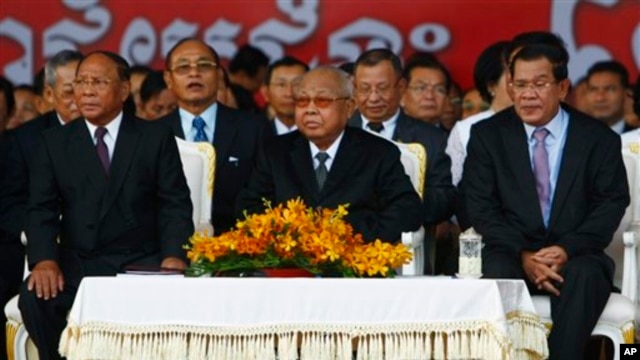Analysis
The ruling Cambodian People’s Party’s “extraordinary” nationwide congress this weekend will likely see its next generation of leaders take their places on the party’s central decision-making body as it prepares for do-or-die elections in three years time, CPP insiders and analysts have told the Post.

One source close to the party suggested that up to 100 younger members, including children of top party figures, could be elected to the powerful central committee of the CPP, the political structure of which remains a testament to its Marxist-Leninist roots.
The last time that the party significantly expanded its central committee was in 2005, when it appointed 121 new members, mostly loyalists to Prime Minister Hun Sen, bringing the total to 268.
The congress will be the first held since the July 2013 national election that saw the CPP’s stranglehold on Cambodia challenged when it lost 22 seats in the 123-seat National Assembly and faced massive street protests challenging the legitimacy of Prime Minister Hun Sen’s decades-long rule.
How to maintain party loyalty and discipline in the face of a surging opposition, while making the necessary reforms and policy recalibrations to recapture lost votes will be priorities on the agenda at the three-day meet, which starts on Friday, according to party sources and a schedule obtained by the Post.
“The congress should [actually] be next year, in early 2016.… [But] this time we convened the congress early, [because] we want to focus on reform,” said a CPP central committee member, who requested anonymity due to the sensitivity of the topic.
“We have to get the lessons learned from the 2013 election,” he said, adding that what happens before the next poll would spell “the death [or] life of the CPP”.
The source said that younger party members would almost certainly be added to the central committee but declined to name names. He added that it was not impossible that the CPP’s executive body, the standing committee or politburo, could also see new members added.
The 34-member politburo is stacked with veteran party members and includes the heads of the army, the police, the Supreme Court, and the National Bank. New members were last added in 2009.
Within the CPP’s younger ranks, a few names stand out as candidates for future leadership positions, observers say.
These include two of Hun Sen’s sons: Hun Many, 32, a lawmaker and head of the party-aligned Union of Youth Federations of Cambodia (UYFC), and his brother, army Lieutenant-General Hun Manet, 37.
Environment Minister Say Sam Al, 34, the son of CPP secretary-general Say Chhum, and Sar Sokha, 35, a lawmaker and son of Interior Minister Sar Kheng, are also seen as being groomed for power.
An independent analyst who requested anonymity to openly discuss internal CPP politics said that the congress would see the party “analyse” what went wrong in 2013.
“And from what I have heard, the solution is youth,” he said.
In that vein, he continued, the congress would try to have UYFC formally recognised as the CPP youth wing, along with adding “a lot” of younger members to the central committee.
But, he added, “at the same time [as expanding the central committee], you have to have bargaining power inside the standing committee itself”.
“So the question is what would be the mood during the congress? If it is favourable, I think they will push to have some young blood within the standing committee [too],” he said.
Carlyle Thayer, a regional expert at the Australian Defence Force Academy, agreed that while the standing committee was already an “oversized body”, it is clear the party “needs to introduce a process of generational change lest it suffer from an ageing leadership and abrupt transition in the future”.
However, other observers, such as Sophal Ear, author of Aid Dependence in Cambodia: How Foreign Assistance Undermines Democracy, cautioned that while some younger leaders, like Hun Manet, would be “preferable to any of the current people”, there are a number of other, less-qualified CPP princelings who covet power.
“Can you imagine the kids of 34 [standing committee] members, all of whom think they deserve to step into their parents’ shoes? All of whom think they’re God’s gift to Cambodia?”
CPP spokesman Khieu Kanharith said yesterday that he could not confirm that new members would be added to the committees. On Monday, standing committee member Nay Pena claimed politburo changes were not on the agenda.
According to a leaked schedule, the congress will be briefed on the party’s strategy to stay strong despite the challenge presented by the opposition in the most recent election.
“Through the successful control of the political situation, security, public order, the economy, society and foreign affairs, the party [has] ensured loyalty among party members and the public,” it says.
It adds: “the party has [decided] to pay strong attention to recruiting and increasing [the representation of] young officials including women, in every part of the [party] infrastructure”.
But while the CPP’s ultimate aim is to claw back votes lost to the Cambodia National Rescue Party and hold on for another term, nothing less than a total overhaul of the ruling party’s political culture will achieve that, the opposition says.
“The habit that [has] really driven the CPP to this kind of situation is the corruption, and corruption is something that really puts the people off from supporting the party,” said CNRP whip Son Chhay.
“And the corruption is derived from the very top of the party. So it’s not [just about] changing the old and creating the new.… The top leadership must change their attitude.”

No comments:
Post a Comment